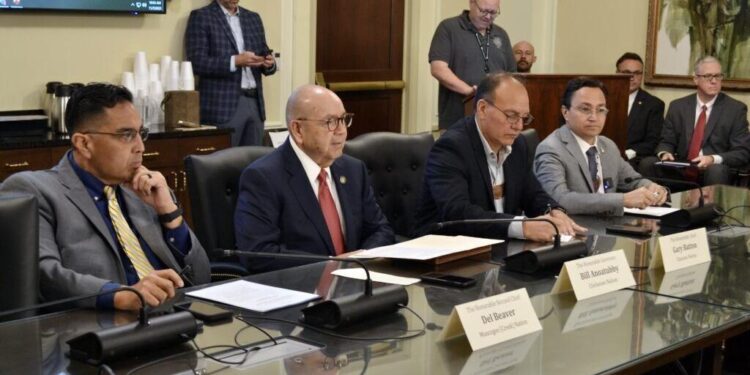OKLAHOMA CITY — Although Gov. Kevin Stitt wasn’t in attendance at a Tuesday legislative hearing, his presence loomed large as key tribal leaders spoke about the importance of compacts between the state and Oklahoma’s tribes.
Four tribal leaders told lawmakers collaboration, cooperation and mutual respect are key to the state and tribes working together to renegotiate compacts and craft new agreements.
Left unsaid was that many of the state’s tribes have bristled at Stitt’s attempts to renegotiate state-tribal compacts on gaming revenue, hunting and fishing licenses, tobacco tax revenue and motor vehicle registrations.
Stitt, a member of the Cherokee Nation, has feuded with many tribal leaders as he has challenged the limits of tribal sovereignty and pushed to renegotiate compacts in an attempt to increase state revenue.
Tuesday was the first day of a two-day interim study on the history and importance of state-tribal compacts hosted by House Speaker Charles McCall, R-Atoka. Although it is rare for legislative leaders to host interim studies, which lawmakers use to explore issues on which they might craft legislation, McCall’s study comes as lawmakers could be asked again next year to extend tobacco and motor vehicle compacts with the tribes.
McCall said there are at least 555 compacts and interlocal agreements between Oklahoma tribes and various government entities.
Cherokee Nation Principal Chief Chuck Hoskin Jr. said compacts serve as a way for the state and tribes to avoid conflict and litigation.
“We can choose endless conflict,” he said. “We can choose endless controversy. We could go to court every single time, but when we choose not to, we have plenty of examples as to why this works. Favoring compacts is certainly in all of our best interest.”
Oklahoma has compacted with the tribes since a 1991 Supreme Court ruling affirmed the state’s authority to collect tobacco taxes from non-Natives in Indian Country. The first tobacco compacts were inked after that decision, said Chickasaw Nation Gov. Bill Anoatubby.
Several tribal officials said they would like to see lawmakers set a specific process for compacting.
Chickasaw Nation Special Counsel Stephen Greetham said there have been five different ways the state has compacted with the tribes in the past, ranging from the governor crafting agreements without the Oklahoma Legislature’s involvement to lawmakers compacting without the governor. He said several scenarios involved both the legislative and executive branches.
Anoatubby urged lawmakers to increase the amount of power vested in the Legislature’s Joint Committee on State-Tribal Relations, which vets proposed compacts. He also said he wants Attorney General Gentner Drummond to lead a comprehensive study on the issue.
“I believe that we’re going to get a lot more done if we simply work together,” he said. “The state’s going to benefit. The tribes are going to benefit. One doesn’t need to try to get it over on the other one. It needs to be a respectful exchange.”
The authority to compact with the tribes is the subject of litigation before the Oklahoma Supreme Court. Stitt argues that only he has the authority to negotiate compacts while legislative leaders say the Legislature plays a key role.
Despite objections from Stitt, the Legislature this year extended for one year some of the state’s tobacco and motor vehicle registration compacts.
Asked if the tribes had received any new compact renewal offers from Stitt in the months since, tribal leaders said they had received a letter proposing new tobacco compact terms for the next 10 years.
The proposal from the Governor’s Office would maintain the state and tribes evenly split tax revenue from the sale of tobacco products to non-Natives in Indian Country but modify the definition of where the agreements would apply.
Anoatubby said the offer is a step in the right direction and an improvement on previous offers. Choctaw Nation Chief Gary Batton said he viewed the letter as a demand, not a starting point for negotiations.
The governor has not heard any response from Batton or anyone in the Choctaw Nation government in response to the offer, Stitt spokesperson Abegail Cave said after the study.
“The Governor’s door is always open to anyone interested in discussing compacts,” she said.
Wes Nofire, Stitt’s newly appointed Native American liaison, attended the study. The Inter-Tribal Council of the Five Civilized Tribes previously passed a resolution of no confidence in Nofire.
As a result of the U.S. Supreme Court’s 2020 McGirt decision, which found that much of eastern Oklahoma remains reservation land, Stitt has tried to renegotiate tribal compacts to limit the definition of Indian Country in which the agreements apply.
Although the tribes have praised the McGirt decision as a win for tribal sovereignty, Stitt has said the ruling creates uncertainty and poses a threat to state sovereignty.
“Tribal sovereignty is what I was elected to uphold,” said Muscogee (Creek) Nation Second Chief Del Beaver. “Tribal sovereignty is what I was elected to protect. And tribal sovereignty should not be a word that’s feared among nontribal citizens.”
McCall said while there is a path for the Legislature to take complete control of compacting, he would prefer if Stitt worked alongside lawmakers to find a solution that benefits everyone.
“We’ve shown a lot of deference to the governor over the last five years of his governorship in this area,” McCall said. “We still have a willingness to want to work with the governor, but … you can see today how we are engaging the tribes on these issues is being much more well received than previous methods.”
Want to reach a local audience and grow your business?
Our website is the perfect platform to connect with engaged readers in your local area.
Whether you're looking for banner ads, sponsored content, or custom promotions, we can tailor a package to meet your needs.
Contact us today to learn more about advertising opportunities!
CONTACT US NOW




